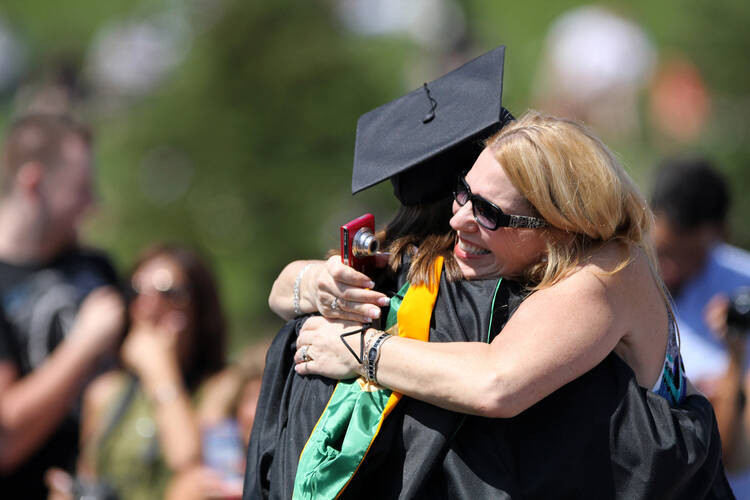As summer draws to a close, families deliver their sons and daughters to college. They have checked the ratings, visited the campuses and “fit” the young person into an environment where they hope he or she can thrive. Private college tuition in the United States runs from an average of $25,000 a year to as much as $50,000, plus room, board and books. To afford this some parents are forced to work two or more jobs, postpone retirement, skip vacations—even sell their homes. To them the investment is worth it, but people measure value in different ways. A college education may “pay off ” in a Wall Street job or, for others, two years in the Peace Corps.
Because of the crippling effects of economic inequality, education matters more than ever. But recent headlines bring bad news. Eighty-nine percent of colleges report a rise in clinical depression and 58 percent in anxiety disorders. Binge drinking clouds the mind. Counseling centers struggle to meet the demand, with long wait times to see a psychiatrist. Meanwhile, well-known universities grapple with how to prevent and fairly prosecute sexual assault. According to U.S. Catholic (Sept. 2015), eight Catholic schools have introduced sexual assault prevention programs. Others have banned fraternities and sororities and prohibited alcohol.
Students’ responses to these and other moral crises will depend on the values they have learned from their families and what they learn in class and the dorms. But beneath these experiences is a more fundamental problem, one that rarely makes the headlines but is at the heart of higher education in the 21st century.
In a provocative essay in the September issue of Harper’s, “The Neoliberal Arts,” William Deresiewicz, author of Excellent Sheep, indicts the encroachment of neoliberalism, an ideology that reduces all values to money, on campuses. Its purpose, he says, is to “produce producers” rather than “complete human beings.” One need not adopt his terminology or agree with his examples to see the importance of his argument. Indeed, his central thesis is consistent with the mission of Jesuit higher education and many other colleges, religious and secular: the college experience must enable students to “build a self or (following Keats) to become a soul.” This standard measures a graduate by who she becomes as a person, not on how much she makes.
This is not an elitist idea. It applies to anyone who wants to read a book, sing a song, appreciate a painting or a show. And a student can major in anything—filmmaking, engineering, accounting, nursing, theology or management—and still, if the core curriculum is strong, receive a solid liberal education.
Governors and presidential candidates have proposed several ideas for higher education reform. Florida’s Gov. Rick Scott, to save money, wants to charge higher tuition for those who major in liberal arts in order to attract more engineering and biotechnology students. Wisconsin’s Gov. Scott Walker tried to rewrite the University of Wisconsin’s mission statement, crossing out public service and replacing “search for truth” with “meet the state’s workforce needs.” President Obama once promised that “folks can make a lot more” learning manufacturing and trades than with an art history degree.
Our leaders are responding, in part, to the student debt crisis, which leaves many students in need of a well paying job in order to get a good start in life. Senator Bernie Sanders has proposed the College for All Act, by which the federal government would cover 67 percent and the states 33 percent of the total tuition of public colleges and universities. The money would come from a Robin Hood tax on Wall Street’s investment houses and stock trades. Another proposal would cut by half the interest rates on student loans and enlarge the federal work-study program.
Under either political party, the government must assume its obligation to make education possible. Private schools too, should continue to search for ways to make a college education more affordable for poor and middle-class students. All students should have the opportunity to take the unique journey that college affords.
For those entering college this fall, make the most of it. Pray, make a retreat or take an in-depth course on a Gospel. Choose a mentor, attend a lecture, seek guidance on your future. A service project, especially the chance to help the sick and the poor, can educate the heart. After a year abroad, one will never be the same. Embrace friends; struggle to keep them for life. Read some of the Great Books—Tolstoy, Dostoevsky, Hugo, Dickens, Austen, Melville. The goal is not to “teach a lesson” but to allow the great writers to intimately enter the lives of readers literally hundreds of years and thousands of miles away. In this way they live again, and we “build a self, become a soul.”








